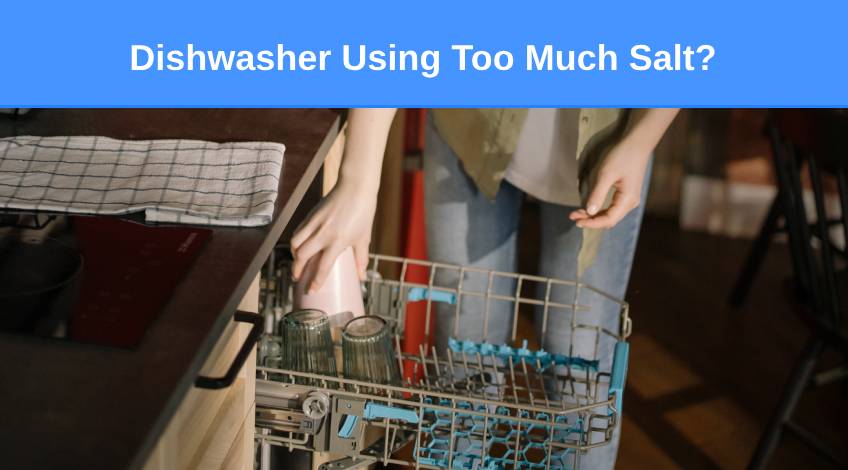
Dishwasher Using Too Much Salt? (here’s why & what to do)
If you feel your dishwasher is using too much salt, it could be caused by a number of factors. This problem occurs more than you might think and is usually relatively easy to solve.
Whether this is your first dishwasher or you have been using a dishwasher for many years, keep reading to find out why and what to do about it.
How To Tell If Your Dishwasher Is Using Too Much Salt
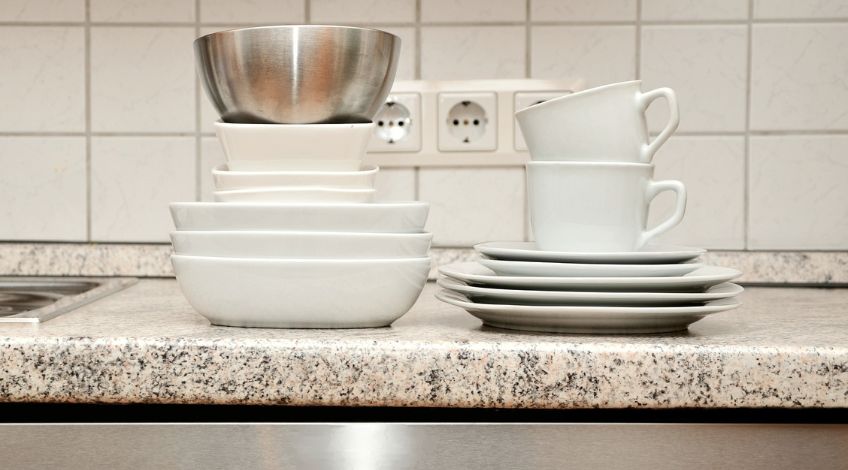
There are several tell-tale signs that indicate that your dishwasher could be using too much salt these include;
Dishes Taste Salty
If you notice that your dishes and cups have a salty taste after being washed in the dishwasher, it’s a good indication that too much salt is being released during the cycle.
Dirty Dishes
If the dishes come out of the dishwasher still dirty or with a residue on them it could indicate that the dishwasher is using too much salt.
Salt Indicator Light Appears More Often
If you find yourself having to refill the salt reservoir more frequently than usual it is most likely that the dishwasher is using too much salt.
What Causes The Dishwasher To Use An Excess Of Salt?
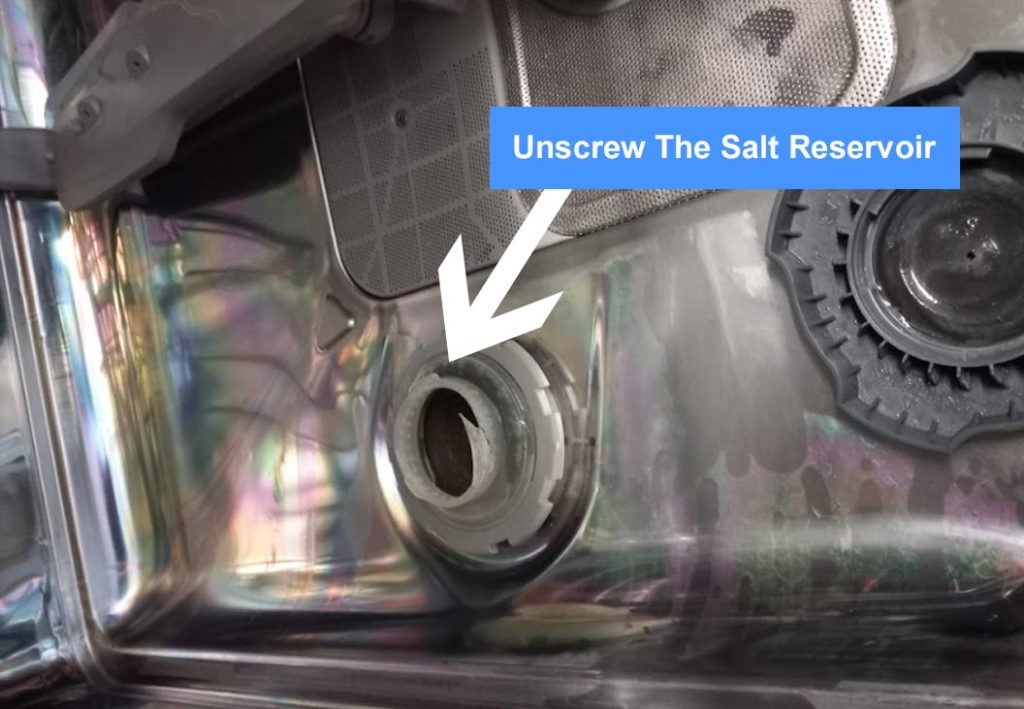
If your dishwasher is using an excessive amount of salt it is probably caused by one of the following;
- Loose Cap
If the cap on the salt compartment is loose the dishwasher is likely to release too much salt during the cycle. Ensure that your cap is tight before running your dishwasher. - Damaged Cap
If the cap on the salt compartment is cracked or damaged, it will allow excess salt to get into the dishwasher. This might need a professional to repair it as they can be difficult to remove. - Damaged Seal
If the seal on the salt cap or salt compartment is damaged, it can allow too much salt to be used during a cycle. This is again something that you’ll unfortunately need a professional to help you with as they’re hard to repair from home. - Water Hardness Level Set Incorrectly
If the water hardness level is not set correctly, it could mean the dishwasher uses too much (or not enough) salt. Consult your user manual for more information. - Dirty Dishwasher
A dirty dishwasher could result in the use of too much salt. You need to clean the dishwasher regularly by running a hot service wash at least once per month to ensure that your dishwasher is clean. - Clogged Salt Dispenser
If the salt dispenser has a blockage or becomes clogged, it can cause the appliance to use too much salt. It is important to run a hot service wash regularly to prevent this from happening. - Salt Compartment Leaking
If the salt compartment has a leak it will almost certainly use too much salt. You’ll need an expert to help you with this issue. - Overfilling The Salt Compartment
If you overfill the salt compartment it could cause excess salt to be used which will leave a residue on your dishes. This not only uses too much salt but leaves your dishes dirty as well. Make sure you only fill it to around an inch below the top of the reservoir. - Using 3-in-1 Tablets
If you use 3-in-1 tablets in your dishwasher, it could lead to excessive salt usage. It is recommended that you use separate dishwasher salt, rinse aid and detergent. - Water Inlet Valve Stuck Open
Over time, the water inlet valve can become faulty which could cause the appliance to use too much dishwasher salt. A competent repairman should be able to diagnose and fix this if it’s the case.
To ensure that your dishwasher only uses the correct amount of dishwasher salt, you should; only ever use dishwasher salt (not table salt), ensure that your dishwasher is cleaned regularly and ensure that the water hardness level is set at the appropriate level for the water hardness in your area.
If the cap is damaged, it will need to be replaced. You should always ensure the cap is fitted correctly.
If the seal is damaged it will need to be replaced, in some cases, this will mean replacing the water softener unit as a whole.
If the dispenser is clogged or there is a leak, it will need to be dealt with as soon as possible.
Consult your user manual for instructions on how to adjust the salt level appropriate for the water hardness in your area.
You should also ensure that the rinse aid reservoir is regularly topped up. Some dishwashers have an adjustable rinse aid level too (consult your user manual for more information).
You should inspect the water inlet valve and if you suspect it is faulty, we recommend contacting a technician to repair/replace it for you.
Why Is It Important To Only Use Dishwasher Salt?
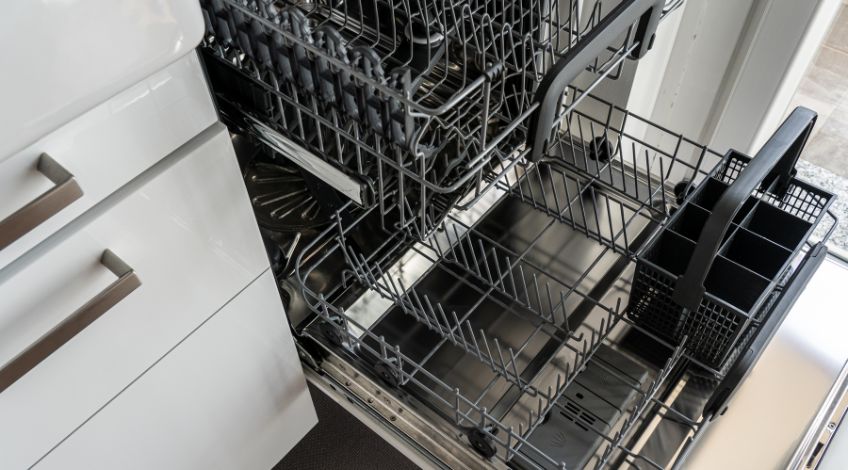
You might be thinking, why do you need to use special dishwasher salt, why not use table salt? The reasons that you should never use table salt to top up the salt reservoir on a dishwasher are;
- Dishwasher Salt is Coarse
Dishwasher salt is designed to not clog up the tubes and salt dispenser and dissolve slowly to ensure it does its job properly. Table salt is too fine which could lead to it clogging up the softener unit, tubes and hoses and run out too quickly. - Table Salt Contains An Anti-Caking Agent
To prevent table salt from clumping, it has an anti-caking agent added. This is usually magnesium which is one of the minerals that we are trying to eradicate from the dishwasher. This would render the softener as useless and cause more problems.
What Does Dishwasher Salt Do?
Dishwasher salt is added to the salt reservoir and is used to help remove the minerals found in hard water. If left, those calcium and magnesium minerals would form a hard coating that would eventually clog up the tubes and hoses of the dishwasher and cause it to break down.
Every time you use your dishwasher, it uses dishwasher salt to remove the minerals that cause limescale. If you live in an area which has hard water (which is more than 60% of the UK), it is important that you keep the salt reservoir topped up in your dishwasher.
Hard water areas will need topping up with dishwasher salt at least once per month. However, areas that have soft water might only need topping up with dishwasher salt once every 3 months or less.
How To Clean A Dishwasher
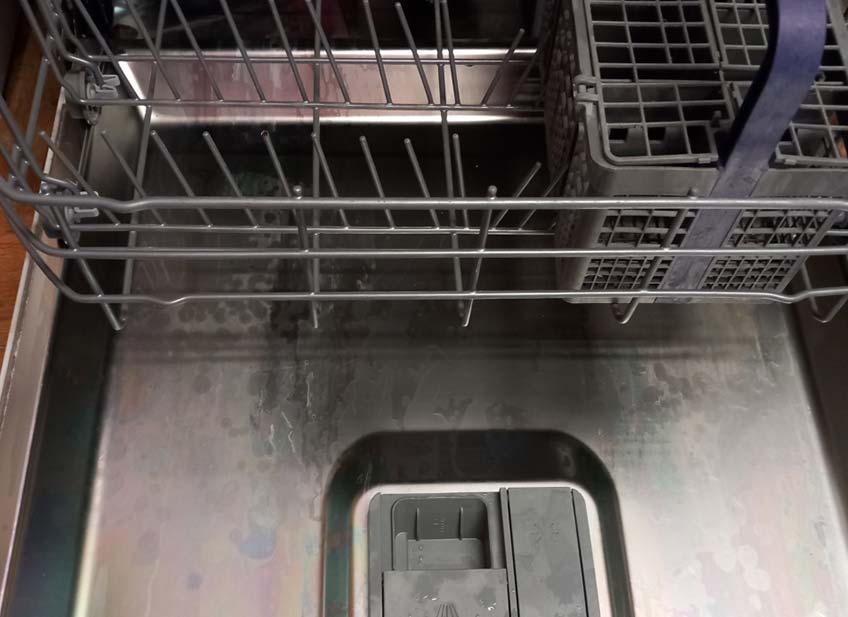
Cleaning the dishwasher once a month is necessary to prevent any problems including the over use of dishwasher salt. All you need to do is either;
- Use A Commercial Dishwasher Cleaner
To use a commercial dishwasher cleaner all you need to do is follow the instructions on the packaging. - Use White Vinegar
You should place a bowl filled with white vinegar on the top rack of the dishwasher and run the hottest wash cycle. Ensure the dishwasher is empty during this cycle. Once the cycle has completed you should remove and clean the filter and clean the rubber door seal (gasket) and wipe down the exterior of the appliance.
SEE ALSO:
- What Does Dishwasher Salt Do? (and where to put it)
- Dishwasher Salt Alternatives (what you can use instead)
Frequently Asked Questions
If your dishwasher is using more dishwasher salt than usual, it could be because; the cap is not fitted correctly, the cap is cracked, the seal is damaged, the water inlet valve is stuck open, you have used the wrong type of salt, or the salt compartment is leaking.
The frequency with which the dishwasher salt reservoir needs to be refilled depends on the water hardness in your area. In hard water areas, you may need to top up the reservoir every month.
Dishwashers need dishwasher salt to help soften the water used in the wash cycle. Hard water contains minerals like calcium and magnesium which can cause blockages and damage to the internal components of the dishwasher. The salt helps to remove these minerals helping to keep your dishwasher working properly and ensure your dishes are clean.
Also, follow us on Pinterest ...



